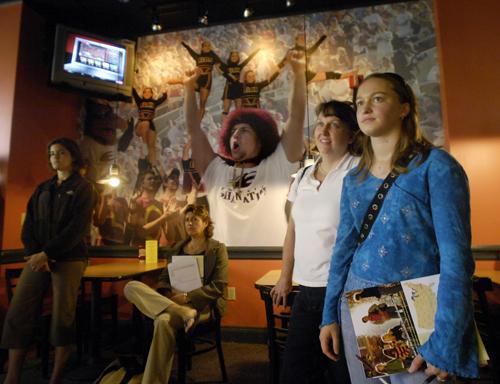As economy tumbles, parents fret over college costs

Oct 15, 2008
Last updated on May 13, 2016 at 03:27 p.m.
ELON, N.C. – Erin O’Connell took the tour this week at Elon University, a handsome, up-and-coming college with a $31,000-a-year price tag. That’s hefty – but $20,000 less than some “uppity” schools she may have to cross off her list.
“I’m going to be pulling out my hair to make ends meet,” said the high school senior from suburban Boston. “I’ll apply for anything and everything I possibly can.” As for more expensive schools, she said: “While the title would be nice, I might not get out with both arms and both legs.”
It’s prime college-visiting season for the high school class of 2009, which next fall will send the greatest number of graduates on to college in American history. But the souring economy and the crisis on Wall Street are shrinking families’ college savings, and some parents wonder whether they will be able to afford tuition at the schools their youngsters are looking at.
Around the country, students deciding where to apply may have to scale back their dreams. Some private schools worry they could lose business to public universities. Already, federal loan applications are up, and some schools are seeing more aid inquiries.
Get The Daily Illini in your inbox!
Most students won’t decide on their college plans for six months. But a recent survey of 2,500 users of the Web site meritaid.com found 57 percent of students were considering a less prestigious school for money reasons. In a similar study by Applywise.com and Next Step Magazine this week, 50 percent of families reported limiting their children’s college choices to less expensive options.
Because of plummeting housing prices, many families can no longer count on the equity in their homes to help them pay for tuition. Meanwhile, 529 college savings plans have been hit hard in the stock market. A year ago, they held a combined $110 billion. Preliminary figures from Financial Research Corp. show the value of 529s declined 9 percent last quarter even with new money coming in – and that was before last week’s slump on Wall Street.
“We’re revisiting their overall financial plans,” said Ivan Nalibotsky of Capital Solutions Group, a college financial planning service in Bethesda, Md. “In many cases folks are going to have to be dipping into some of their own personal resources, and reevaluating their personal retirement goals in order to get the kids the four or five years of education they planned.”
One of his clients now plans to start at a community college and transfer to the University of Maryland rather than going straight to a four-year private college.
Some parents are hoping to secure financial aid, something they previously assumed they didn’t need or couldn’t get.
“We haven’t qualified before. We might now,” said Betty Morris of West Chester, Pa., who was touring Elon this week with her son Jack.
The good news for such families is that the college financial aid system is in many ways tilted toward higher-income families, thanks to tuition tax breaks and financial aid that is based on merit, not need. At Elon, for instance, about 40 percent of the 5,000 students get merit aid.
When it comes to need-based aid, many middle-income families underestimate their chances and focus too much on the “list price.” A large number of schools have substantially expanded aid in the past few years. At many highly competitive colleges, families earning $80,000 typically pay no more than half price.
A few prestigious schools that cost $50,000 or more a year have made more aid available to families earning well into six figures. At Princeton, for instance, virtually all families earning as much as $200,000 qualify for grants covering half of tuition or more.
O’Connell’s mother, Rosemary O’Connell, an executive assistant at a financial firm, said: “We’ll do what we can for her. We don’t want her to graduate $200,000 in debt.”
Parents’ college savings funds are taking a hit at the same time many schools’ endowments are being eroded by the downturn in the stock market. Colleges rely on their endowments for financial aid.
“It won’t be an impossible problem for Harvard, Pomona, Princeton, but a lot of other colleges will find it hard to provide the same level of aid as in the past,” said Robert Shireman of the California-based Institute for College Access and Success.
Ultimately, many parents will simply stretch and borrow. Higher education is so important to many families, it often doesn’t obey the laws of supply and demand.
“They always said, ‘You pick the school, we’ll figure out the money,'” Emily Schroeder of Baltimore, who is applying to Elon this year, said of her parents. Her mother, Judy, said price is a consideration but not the biggest one.
“It’s her future and I want her to be happy and I want the fit to be right,” she said. “If it cots a little more money, that’s OK.”
The other option: be very smart, or very lucky. Only one parent on the Elon tour looked fully at ease – Pat O’Hara of Richmond, Va., who was visiting with daughter Lindsey. Cost really isn’t a factor, he said: “I moved all into cash about six months ago.”





